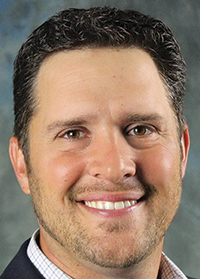NWA programs ramp up to address technology talent gap
by June 1, 2022 10:09 am 1,783 views

G.B. Cazes, CEO of Conway-based consulting firm The Emery Group, is working with the Northwest Arkansas Council on tech workforce development in the region.
Technology jobs are in demand in Northwest Arkansas, and area employers and organizations have programs and money available to support the continued development of the tech workforce.
Still, barriers remain to meet tech talent demand.
G.B. Cazes, CEO of Conway-based consulting firm The Emory Group, is working with Springdale-based nonprofit Northwest Arkansas Council to address the issue of tech workforce development.
The tech talent gap has been a national issue since he started working in the industry 20 years ago. He added that the demand for tech talent continues to rise along with the need for technology. And the talent gap is widening.
“Everything we do — live, work, play and learn — is all tied into technology these days,” he said. “Even if you’re not a tech company, you need technology to operate and run. The demand for talent is ever-increasing.”
Area drivers for tech talent demand include large companies, such as Walmart Inc. and J.B. Hunt Transport Services, those that supply and support them, and startups.
Cazes is working with the council to build tech talent development programs and strategies in Northwest Arkansas. He’s engaging with employers to identify their needs and create programs to fit them.
“One of the successful programs we’ve had is the technology apprenticeship program,” he said. “This is a statewide program. We’ve been working with the Arkansas Center for Data Sciences. They were formed out of a Blue Ribbon Commission of Gov. [Asa] Hutchinson’s.”
The center receives state and federal grants to pay for the apprenticeship program and provide training to employees of companies with tech talent needs. Northwest Arkansas apprentices are expected to more than triple this year to about 300, from 99 in 2021. That’s also up from 36 in 2020, he said.
“Now that the word is getting out, there’s a lot of repeat buyers,” Cazes said. “We continue to see that growth, and now we’re engaging with the big three, specifically Walmart and J.B. Hunt. That’s what’s causing those numbers to grow exponentially because of the scale of those organizations.”
Another program, NWA Tech Academy, provides employers with software development interns. “We provide subject-matter experts to mentor those interns and work with the employer to ensure they deliver the quality, standards, and best practices of work they need for the projects they’re working on,” Cazes said. “It’s a turn-key solution for employers.”
Cazes also is working with the city of Fayetteville to create a five-year strategic plan to develop tech talent and make the region a training hub. He said that the vision is to become a national model for tech workforce training to close the talent gap. The plan is under review by the city.
This year, Cazes looks to work with other Northwest Arkansas cities on similar plans and identify the tech talent needs of the respective cities without duplicating their efforts.

‘MODEST GROWTH’
“Our area is only showing modest growth for technology workforce development,” he said. “It will be crucial moving forward as this area continues to grow and thrive. We can train the next generation of tech practitioners in ways that go beyond traditional schooling or college and include some creative avenues for workforce development.”
According to a Brookings analysis of Emsi Burning Glass data, tech sector employment in Northwest Arkansas rose by 4.6% to 3,229 jobs in 2020, from 3,086 jobs in 2019. That’s up 18.8% from 2,718 jobs in 2015.
Adams said workforce development is a reoccurring theme in his discussions with the companies on the area benefits of the tech summit. He noted that grant-making organizations and tech companies of all sizes support the conference.
“Across the spectrum, all of them seem to be concerned that we need to find ways to make sure that technology workforce development is accessible to those who may be traditionally underrepresented in tech or may come from lower socio-economic statuses and not have the means to a traditional education in the field,” he said.
HIGHER PAY
Cazes said technology jobs offer wages significantly higher than state and national averages. He said the COVID-19 pandemic led coastal tech employers to hire more remote workers, including in the central United States. The employers are saving money while offering high-paying jobs for remote workers. He said this is an opportunity for Northwest Arkansas to retain its workforce while working remotely for the employers.
According to the Bureau of Labor Statistics, $93,180 is the average salary for software developers in Northwest Arkansas. The average salary is $167,420 in the San Jose-Sunnyvale-Santa Clara, Calif., metro area.
“It’s a huge economic driver for today and the long run,” Cazes said. “Last time I checked, roughly 2,500 technology jobs were open today in Northwest Arkansas. If you filled those all today, there would be 2,500 tomorrow because you can never satisfy the need for the demand.”
He noted that a challenge in developing the area tech workforce is access to high-speed internet, especially for remote workers and those who grew up gaming. He expects tech jobs to be filled with a mixture of workers in the region and out of the area. Short-term, he expects senior-level tech talent to be recruited into the area as the training programs grow.

WORKFORCE PRIORITY
Joe Rollins, director of workforce development for the Northwest Arkansas Council, works closely with Cazes on tech workforce development. Rollins expects the continued development of tech workers will remain a top priority for workforce development in the region.
Top needs include software developers, user support specialists, systems engineers and architects, information technology project managers, network and systems administrators, data analysts and data scientists.
“The IT list of our needs continues to grow and develop, and that’s a great challenge for us to work through because it shows the growth of our businesses and the strength of Northwest Arkansas’ economy going forward,” Rollins said.
New entry-level positions become available as area tech workers improve their skills and move into advanced roles. Along with the council’s work, Rollins noted that area employers offer programs to allow workers to improve their skills. The employers have developed custom training programs with the help of the Center for Data Sciences, University of Arkansas Global Campus, NorthWest Arkansas Community College and Northwest Technical Institute.
Rollins said one of the barriers to tech workforce development is job perceptions instead of discussing what the position entails with the employer. Another is to raise awareness that money is available to help support workers’ tech training.
Teresa Hudson, director of Ignite Professional Studies, said the Bentonville Schools program started seven years ago with 15 tech students. Since then, it’s added multiple workforce development programs focused on area employer needs and partnered with companies, such as Walmart and Tata Consultancy Services. Its tech students have received internships that have led to job offers as junior developers for the Bentonville-based retailer.
“Our students are saying, “Oh my goodness, I can … start making this good salary while going to school and being with some of the brightest minds in computer science,” Hudson said.
TALENT RECRUITMENT
Carter Malloy, CEO of Fayetteville-based farmland brokerage AcreTrader, said the firm has grown from about 20 employees last year to 100 this year. He said that he expects to have more than 200 employees next year, mainly comprising tech workers.
Malloy attributed the firm’s tech recruitment success to “brute force” as it employs two full-time recruiters and has multiple third-party recruiters. He said the firm has allowed employees to work remotely to overcome the tech talent gap. It’s also relocated employees to the area from Chicago, Denver, New York, Seattle and Austin, Texas. He noted that the region and state do not have enough developers.

“We’re recruiting from outside the area quite heavily and moving some people here to Northwest Arkansas,” he said.
Payton Lenz, head of digital experience and technology at the upcoming bikeable office building Ledger in Bentonville, was recruited to Northwest Arkansas from Atlanta through the Northwest Arkansas Council’s Life Works Here initiative, which offers $10,000 and a bike to tech workers who relocate here. After leading internet of things (IoT) projects for Walmart U.S., he joined Ledger in April.
“We’re building this tech-forward building to help draw in the community,” Lenz said. “We’re hoping this kind of experience will help draw in other tech startups from around the country or world. We’re trying to make this one-of-a-kind experience that no one’s ever seen.”
He said that Ledger, a six-story bikeable building, is slated to open in October.
Lenz, an IoT consultant, noted that one of the barriers to recruiting tech talent is competitive pay compared to other areas, such as Dallas.
“You can’t be mad at someone for turning down a $300,000 offer to go to Citibank,” he said. “We have to compete with that in this area.”

Since September, Virginia Beach, Va.-based DroneUp has been involved in tech workforce development in Northwest Arkansas, said Kris Cravey, chief people officer. The company employs drone pilots, software developers and other technical roles. It’s hired employees from the area, and some have relocated here. As DroneUp scales, it looks at how to develop the pipeline of future talent, he said.
The company has reached out to area colleges and high schools to discuss how it can support drone programs that provide students with certificates and degrees. It’s also looking into offering its DroneUp flight academy that will allow those who complete it the opportunity to move into jobs.
Over the next three to five years, he expects the company to have several hundred employees in the area.
DroneUp is one of three drone technology companies that have partnerships with Walmart. In November, Walmart announced expanding its DroneUp partnership to provide drone delivery of goods from Farmington, Rogers, and Bentonville stores.
